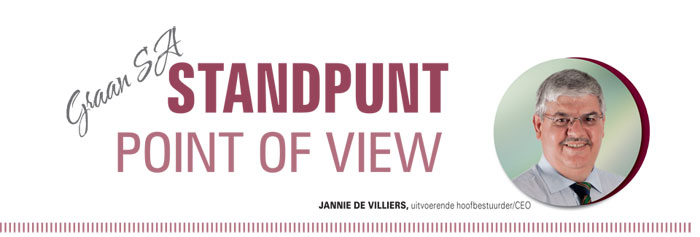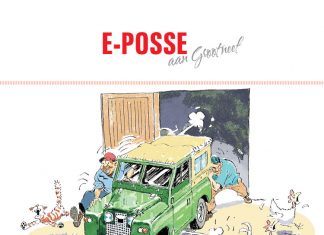September 2016

JANNIE DE VILLIERS, uitvoerende hoofbestuurder/CEO
— Grain SA works diligently on sustainability strategy
When interaction between people becomes stormy and heated it is understandable that one gets confused with what it really boils down to.
Grain SA was recently, inter alia, involved in lawsuits to force the state to meet its responsibilities. The Minister of Trade and Industry a few years ago approved a tariff policy for wheat and now they cannot or do not want to carry it into effect themselves.
Our advocate made a passing remark that it is rather regular practice nowadays to manage government through the courts…how is it possible that we as a country have degenerated to this extent? The reasoning and assumptions are so spurious that one easily mixes fact with fiction. The run-up to the election and the ensuing results definitely played a role in the amount of adrenaline in each policy maker’s head. It seems to me that this is where the problems lie.
If everyone only met their responsibilities and are/were appointed on merit, nobody in these days should panic. There is, especially within the South African Revenue Service, a rule: ‘To not understand is no excuse.’ With the wheat tariff adjustment surely the same rule applies?
It was a year of drought – north and south. Yet there is little or no sign of assistance for producers from the state, but the millers, however, are receiving assistance! How is this possible?
As a result of the reduction in the international price for wheat, the wheat tariff shot upwards, but the state fails to make the adjustments for South Africa. Therefore, wheat is getting cheaper, bread more expensive and the millers’ purses are getting thicker.
According to our calculations the previous round amounted to a R133 million benefit for the milling industry and the current calculations already indicate an additional R185 million. (How I miss the good old days!)
Government argues that the reason for the delay is to benefit the consumers, but meanwhile the bread price continues to increase! Grain SA had to take recourse to the courts as a last resort in the hope that there would be someone who understood what is actually happening now. Someone recently summed up the situation neatly when he drily remarked: To be knowledgeable about something currently does not necessarily mean you also have a say about it. Power has become everything!
I wish to conclude with a concise sentence I recently picked up while reading a scenario explanation on land reform in South Africa: One factor that is going to have a huge impact on our future, is the decline of South Africa’s institutional capacity.
Professor Michael Porter of Harvard Business School in the USA mentions in his book about competitiveness among nations that one of the most important factors lies in the strength of your institutions. Fortunately, agriculture has always been well organised and can pride itself on good institutional capacity.
Grain SA is nowadays intensely busy evaluating this and making the necessary adjustments, so it can form part of our sustainability strategy. Should our academic and research institutions become unable to contribute to our competitiveness, another plan has to be made. Sustainability surely includes the whole chain – from the farm to the consumer’s plate.
Publication: September 2016
Section: Features

















